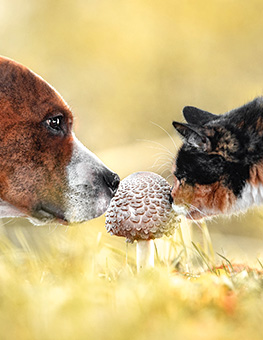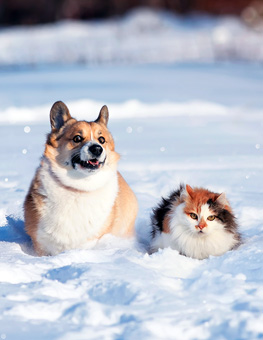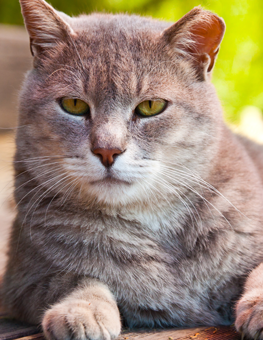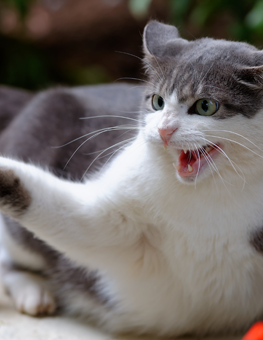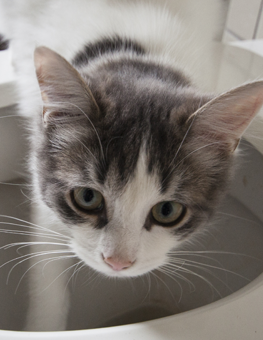Do Fleas Thrive in the Rain?
Heavy rains and big storms are common in the summer months, and this wet weather can actually help fleas thrive.

Rain creates the perfect breeding ground for the insects, including fleas.
While you might think rain can wash away or drown fleas hiding in the grass, water can help fleas stay alive longer, providing a good resource for breeding, hatching eggs, and developing into adults.
Spring and summer months are often considered the rainy seasons and fleas are far more common during this time because they do best in warm, humid environments. Too hot or too dry, and these pesky parasites are less likely to survive. However, rain creates the perfect situation for these insects, helping them survive the harsh conditions until they can find a pet or person to latch onto.
Does Rain Kill Fleas? Not Always.
Fleas can withstand a surprising amount of water. In fact, they can even survive being submerged for up to 48 hours, so a little moisture isn’t going to kill them. Truth is: A good rainstorm may be giving them the perfect breeding grounds.
How Rain Affects Fleas at Different Stages
Read on to discover how rain can help or hurt fleas as they develop:
- Flea eggs are often deposited on the ground, so they’re vulnerable to being washed away by heavy rains. But if they’re deposited on a pet or in an area that doesn’t get wet often, they can survive.
- Flea larvae and pupae develop into adults in cocoons, which protect them from the elements. Heavy rain won’t kill larvae, but it can drown them if they’re submerged for too long or emerge too early.
- Adult fleas can jump long distances, giving them the ability to easily escape wet conditions. Plus, they can hold their breath for up to 48 hours, so a little water isn’t going to kill them. However, heavy rains can wash away the oils that help fleas stay hydrated, meaning they may not survive as long if they can’t find a host quickly.
The Bottom Line on Fleas and Rain
Rain can provide the perfect environment for fleas to lay eggs and develop into adults. The warm temperature combined with high humidity is ideal for fleas, and they can rapidly multiply in these conditions. That's why if you live in an area that gets a lot of rain, you need to be extra vigilant about flea prevention.
Handling Fleas in the Rainy Season
It’s important to check your pet regularly for fleas, even if you don’t think they’ve been exposed. If you think your pet has fleas, here are some steps you can take to get rid of them.
Please note: If you are using flea products for a cat, avoid products containing permethrin.
- Flea shampoos can help kill fleas that are already on your pet. Most flea shampoos require you to leave the shampoo on for about five to ten minutes before rinsing. Flea shampoos since they are rinsed off the pet, leave little residual behind; therefore, are not very effective as a preventative.
-

Check your pet regularly for fleas, and consider preventive measures.
Topical flea treatments are used by many pet owners and can be effective at eliminating fleas when applied correctly and regularly.
- Flea sprays are offered in on-pet and in-home varieties. On pet products can be used to treat your pet, home sprays can be used to treat their bedding and furniture, to help kill and prevent fleas. Just be sure to use the product as directed and spray in a well-ventilated area.
- Flea collars provide full body protection. Collars control fleas by diffusing small amounts of preventative which moves across the pet’s body using the natural oils found in the hair and coat resulting in control of pests from head to tail typically for six or more months.
- Oral products are usually taken monthly to prevent flea development. Since they are systemic control fleas must bite the pet to be killed or prevented.
In addition to flea prevention for your pet, it's also good to treat your yard and home, especially after getting a lot of rain. This can help reduce the chance of your pet encountering these insects in the first place.
Even if you take all the necessary precautions, sometimes fleas can still find their way into your home. If you think you have a flea infestation, it might be time to contact a pest control professional to help get rid of them quickly. With a little patience and effort, you can eliminate these pests for good.



